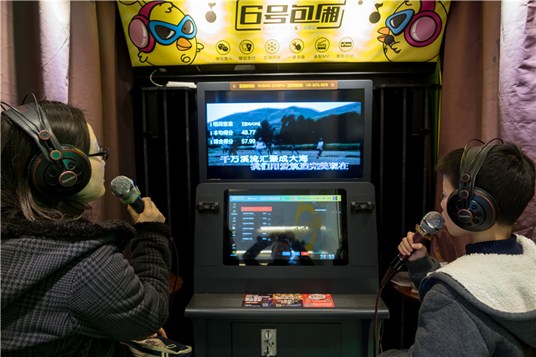Unlike in the past, Chinese people spoilt for choice of entertainment


Editor's Note: Four decades of reform and opening-up have not only turned China into the world's second-biggest economy but also changed Chinese people's way of life. A veteran journalist with China Daily writes about the changing sources of entertainment.
For people like us who grew up in the 1960s, toys were a luxury. We played with whatever things we could get our hands on, from cigarette box paper to candy wrappers, from small pieces of animal bones to even our dirty shoes. And then there was hide-and-seek. As a child, I fell asleep many times while "in hiding".
Children who happened to have an iron jumping frog or a cloth doll were envied. Such toys were sold in stores, but for most of the parents who, despite toiling the whole day, could hardly make ends meet, they were simply not affordable.
Poverty turned kids like us into toy makers. With tree branches, we made catapults; with wood, we made tops; with bricks, we made dumbbells and weights for body-building. We tied disposed rubber gloves, and turned them into long ropes to play skipping games. In fact, I learned table tennis with a paddle I made myself-a plain wooden bat without the sponge or rubber.
Adults at that time hardly had any source of entertainment except playing chess and cards. Jogging? No, that would burn too many calories which people at the time didn't have enough of as they could not get enough nutrition.
Life has changed dramatically over the past decades for the old and young alike because of reform and opening-up and the consequent rapid economic growth. Today, a majority of the kids in cities have at least half a dozen toys, from Barbie dolls to Transformers, from bikes to roller skates, not to mention the video games and apps.
Many parents send their children to after-school classes to learn piano, ballet, tennis, swimming, Taekwondo and even horse riding.
Adults, too, have multiple choices for recreation and relaxation. While chess and cards remain popular among adults, many people today spend more money on entertainment and/or pay hefty amounts to become members of gyms or clubs to do regular exercise and/or play table tennis, tennis, badminton, soccer and/basketball-all to keep physically fit.
In the evening, a majority of the gyms are packed, with youngsters exercising and training in order to lose weight or build muscles.
Hiking and biking have also become popular among youths, and to cater to their needs, city authorities have paved footpaths with rubber on top in parks and are building special routes for biking fans.
And marathons, once rare in China, have become a regular affair today. Nearly 2,000 marathon races used to be held every year in China before the COVID-19 pandemic broke out, with each attracting thousands of participants. And nearly 50 million Chinese people have become regular joggers.
While youngsters and the people with jobs can seek recreation, visit gyms or play sports only after completing their daily duties, for millions of retired people, recreation has become an important part of their life. In the morning, many old people gather in the parks or community squares to practice singing and dancing-from waltz and tango to yangge and Uygur dance-which incidentally is also a form of exercise.
In some places, such singing and dancing continues till quite late in the night. Local community authorities encourage such activities, though they see to it that the decibel level remains low, so that the noise doesn't disturb people in the neighborhood.
Many villages, too, have basic gym facilities built with donations from charities. Such free facilities are especially frequented by retired people and the aged. After getting the needed exercise, the elderly can attend adult education schools to learn calligraphy, painting, classical poems, musical instruments and handcraft.
And many elderly people now own two of the most favorite toys today: cameras and cars. They visit parks and hutongs (lanes) to take pictures in order to demonstrate their artistic skills, and travel in their cars to the distant destinations to fulfill their spiritual need.
The increase in individual incomes has changed Chinese people's choice of entertainment, and entertainment has changed Chinese people's way of life.
The author is former deputy editor-in-chief of China Daily.
kangbing@chinadaily.com.cn

































